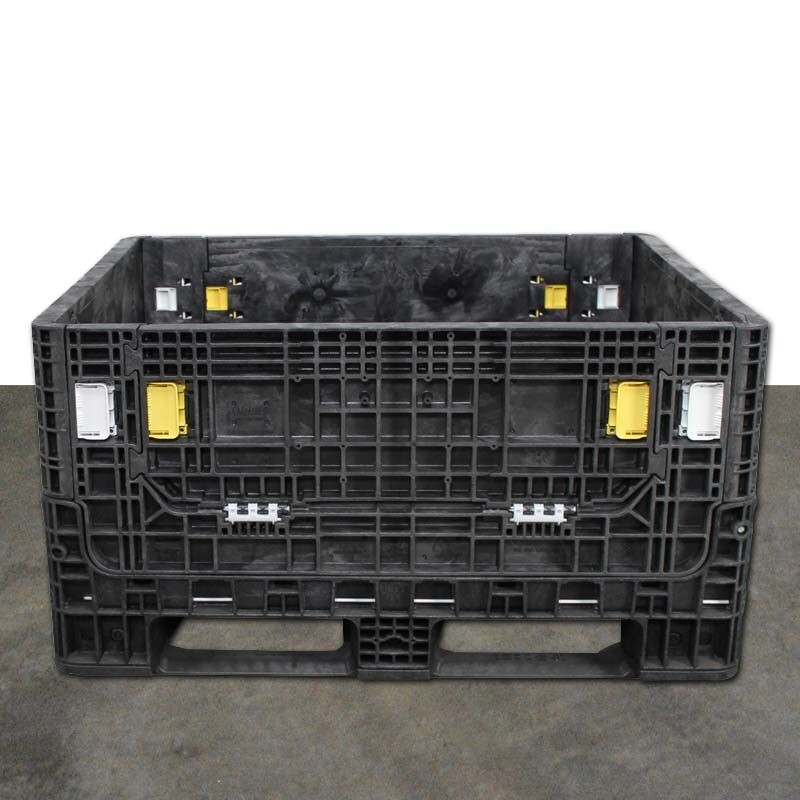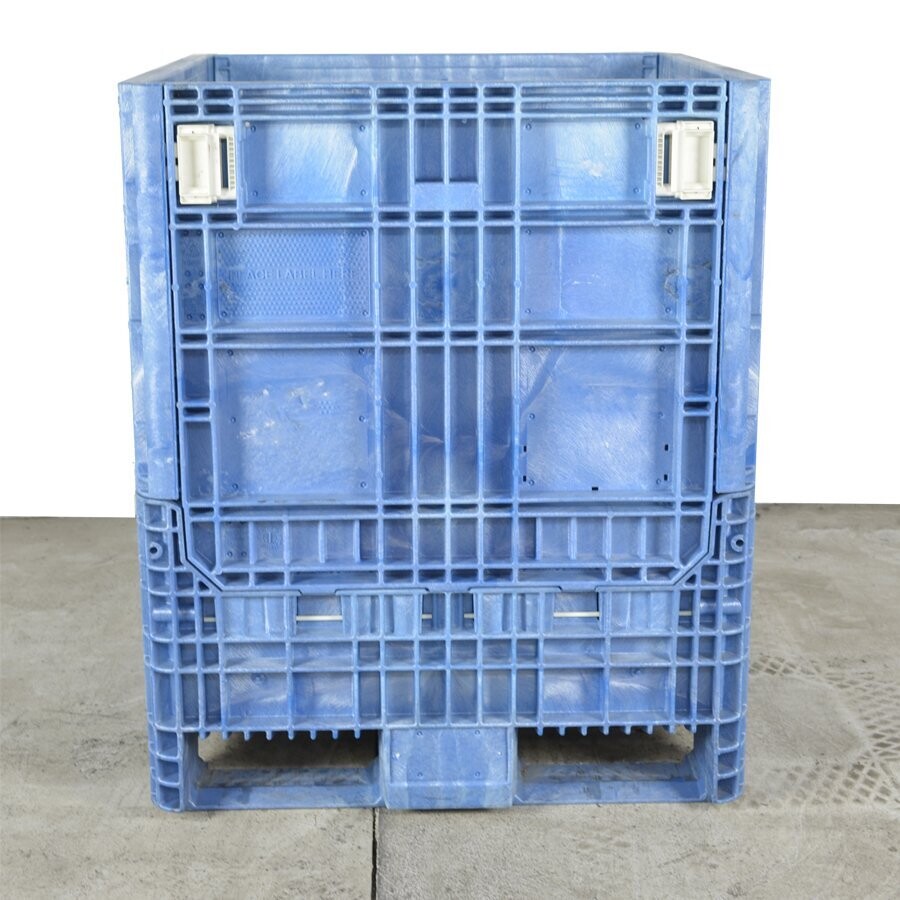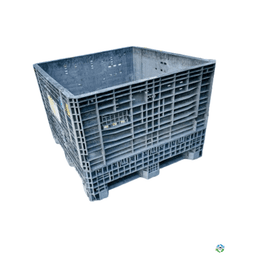Why Bulk Containers Are Necessary for Lasting and Cost-efficient Transport
Bulk containers play an essential role in contemporary logistics. They promote the effective activity of big quantities of goods, therefore optimizing transport processes. This approach not just reduces costs but additionally decreases ecological effect through lower emissions and waste generation. As industries seek even more sustainable practices, the fostering of bulk containers is coming to be significantly substantial. What effects does this shift hold for future logistics and supply chain administration?

The Advantages of Using Bulk Containers in Logistics
Bulk containers reinvent logistics by boosting performance and sustainability. These containers permit the transportation of big quantities of items in a single journey, markedly reducing the variety of journeys called for. This not just streamlines procedures however likewise decreases labor expenses related to handling, loading, and discharging. Furthermore, mass containers are designed to enhance room utilization within transport cars, making certain that more products can be delivered concurrently.
The standardization of mass containers likewise simplifies the logistics process. With uniform dimensions, they can be quickly stacked and kept, causing improved storehouse management. Mass containers typically feature durable products that secure materials from damage during transit, thus lowering item loss and increasing general reliability. Because of this, companies can experience improved supply chain efficiency, inevitably leading to raised profitability and client satisfaction. This mix of variables makes mass containers a crucial possession in modern logistics.
Ecological Effect: Lowering Waste and Carbon Footprint
As industries significantly prioritize sustainability, the adoption of bulk containers has actually emerged as a crucial strategy for reducing waste and decreasing carbon footprints. These containers reduce making use of product packaging products, such as boxes and plastic, thereby especially reducing overall waste generation. By settling shipments, mass containers enhance transport performance, permitting more items to be transported per journey. This decrease in trips directly associates with lower greenhouse gas exhausts, adding to a smaller sized carbon impact.
Additionally, bulk containers can typically be recycled or reused, additionally alleviating environmental influence. The sturdiness of these containers guarantees they can withstand multiple transportation cycles, lowering the need for single-use alternatives. used plastic containers. By streamlining logistics and advertising reliable resource usage, bulk containers not just support sustainable methods however likewise encourage sectors to straighten with worldwide ecological objectives. Eventually, their implementation reflects a dedication to eco-friendly stewardship and liable resource administration
Expense Cost Savings: Just How Mass Containers Lower Transportation Expenses
While numerous firms seek means to boost their bottom line, the usage of bulk containers offers a significant chance for lowering transport expenses. Mass containers maximize the volume of goods moved, permitting businesses to deliver larger amounts at when. This efficiency minimizes the variety of journeys needed, directly reducing gas costs and reducing labor costs linked with loading and discharging.
Furthermore, mass containers typically feature streamlined designs that enhance space usage within transport lorries. This means less voids, leading to much more effective usage of readily available capability. The toughness of bulk containers can decrease the threat of product damages throughout transit, making sure and decreasing losses that more products arrive intact.
Enhancing Supply Chain Performance With Bulk Storage Solutions
Bulk storage space solutions play a vital function in boosting supply chain effectiveness by enhancing inventory monitoring. By consolidating items right into less, larger containers, organizations can significantly decrease taking care of expenses connected with regular transfers and processing. This structured technique allows for much better tracking and management of inventory, eventually leading to boosted functional efficiency.
Structured Inventory Administration
Reliable inventory management is important for enhancing supply chain operations, especially when companies embrace bulk storage services. These options enable businesses to preserve higher stock levels while reducing the frequency of replenishment. By consolidating materials right into mass containers, companies can improve their inventory procedures, reducing the intricacy connected with tracking multiple smaller packages. This strategy promotes exact inventory counts and enhances forecasting precision, permitting more educated decision-making. In addition, mass storage services streamline warehouse organization, making it simpler to situate and gain access to items when needed. Consequently, companies can attain an extra efficient inventory turn over rate, inevitably boosting general supply chain efficiency and lowering the likelihood of stockouts or overstock circumstances.

Minimized Handling Prices
The implementation of bulk storage remedies more info not only enhances stock monitoring but additionally substantially lowers dealing with expenses throughout the supply chain. By consolidating products into bulk containers, business reduce the need for regular handling and transfer in between various storage space and transport systems. This method reduces down on labor expenses related to loading, dumping, and relocating smaller bundles. In addition, mass storage space decreases the regularity of deliveries, resulting in lower transportation prices and reduced fuel consumption. Because of this, businesses can enhance their logistics procedures, enabling a much more reliable allowance of sources. Ultimately, minimized dealing with prices add to improved total supply chain performance, cultivating an atmosphere that sustains both sustainability and financial practicality.

Adaptability of Mass Containers Across Different Industries
Several sectors have distinctive requirements for transport and storage, bulk containers have arised as a versatile solution that meets a vast variety of requirements. These containers, varying from huge bins to specialized tanks, can fit varied products, including granules, fluids, and powders. In the farming sector, mass containers help with the transportation of grains and plant foods, while the food and drink market uses them for components and completed items. The chemical sector depends on bulk containers for safely moving hazardous products, making certain conformity with safety policies. Additionally, building and construction companies gain from mass containers for transferring aggregates and various other products. Their versatility prolongs to various modes of transport, including trucks, ships, and trains, boosting logistical effectiveness. This convenience not just enhances procedures throughout different markets however additionally advertises sustainability by decreasing product packaging waste and enhancing area in transit. Mass containers play an essential function in modern supply chain administration.
Future Patterns in Mass Container Use and Sustainability
The future of bulk container usage is progressively formed by cutting-edge materials growth that boosts sustainability. In addition, automation in logistics promises to enhance operations, lowering waste and boosting efficiency. Embracing round economic climate techniques will additionally transform exactly how bulk containers are developed, used, and recycled, promoting a more sustainable transport landscape.
Ingenious Products Development
As sectors increasingly focus on sustainability, ingenious products development wholesale containers arises as a considerable consider enhancing green transport options. Researchers and makers are checking out eco-friendly plastics, recycled compounds, and light-weight steels to minimize environmental impact. These materials not just lessen waste yet likewise enhance fuel performance by decreasing the total weight of containers. Furthermore, innovations in clever materials, which can adjust to varying conditions, boost the toughness and performance of bulk containers. The integration of these ingenious products aligns with circular economic situation principles, advertising reuse and recycling. As the need for sustainable practices grows, the advancement of such products will certainly play an essential function fit the future of bulk container usage in logistics and transport.
Automation in Logistics
Significant developments in automation are positioned to change logistics and the application of mass containers, boosting sustainability in transport. Automated systems, including drones and autonomous automobiles, are improving the movement of bulk containers, lowering the reliance on conventional fuel-powered transportation. These innovations enhance directing and loading procedures, reducing vacant miles and improving gas efficiency. Additionally, automated stock monitoring systems boost monitoring and surveillance of mass containers, ensuring better source allocation and minimized waste. The assimilation of the Net of Points (IoT) enables real-time information evaluation, allowing proactive decision-making that straightens with sustainability objectives. As automation continues to evolve, it is anticipated to drive additionally innovations in bulk container usage, eventually supporting more lasting logistics practices and decreasing the environmental impact of transportation.
Round Economic Situation Practices
Developments in automation are establishing the stage for an extra integrated method to round economy practices in the domain of mass container usage. As markets significantly accept sustainability, bulk containers are being developed for durability and reusability. This change not just lessens waste yet also enhances source efficiency. Firms are adopting approaches such as closed-loop systems, where utilized containers are collected, reconditioned, and reestablished into the supply chain. Additionally, clever technologies track container life cycles, promoting better administration and lowering environmental impact. The cooperation in between suppliers, logistics service providers, and end-users is vital in developing requirements for lasting container use. refurbished bulk containers. Future patterns show an expanding focus on products that are recyclable and naturally degradable, further enhancing the round economic situation's concepts in mass transport

Regularly Asked Concerns
What Materials Are Bulk Containers Typically Made From?
Mass containers are generally built from sturdy products such as high-density polyethylene, aluminum, cardboard, and steel. These materials give security, strength, and flexibility, making them ideal for delivering different products in different industries effectively.
How Do I Pick the Right Size Bulk Container?
Picking the right size bulk container includes reviewing the quantity of products to be transferred, considering handling devices compatibility, and evaluating storage space needs. Proper dimension assurances efficiency in transport and decreases waste throughout delivery.
Are Mass Containers Reusable or Recyclable?
Mass containers are typically reusable, created for numerous journeys, improving sustainability. Many can likewise be reused, depending on the products made use of. Selecting recyclable alternatives better supports ecological goals and reduces waste in transportation techniques.
What Safety And Security Rules Put On Bulk Container Transport?
Safety and security regulations for bulk container transport include conformity with the Division of Transportation guidelines, proper labeling of harmful products, structural honesty evaluations, and adherence to weight restrictions to ensure secure handling and protect against mishaps throughout transportation.
Exactly How Can Organizations Transition to Using Bulk Containers Effectively?
Businesses can transform to bulk containers by evaluating existing logistics, educating staff on handling, buying ideal devices, enhancing stock management, and working together with distributors to ensure compatibility and performance throughout the supply chain.
As markets significantly prioritize sustainability, the fostering of mass containers has actually arised as a vital approach for reducing waste and reducing carbon impacts. By consolidating materials right into mass containers, business can improve their supply procedures, lowering the complexity linked with tracking multiple smaller plans. As sectors significantly focus on sustainability, ingenious materials development in bulk containers arises as a considerable variable in improving eco-friendly transport remedies. Automated systems, including drones and independent vehicles, are simplifying the activity of mass containers, minimizing the dependence on traditional fuel-powered transport. Furthermore, automated inventory management systems improve monitoring and tracking of bulk containers, ensuring better source allocation and decreased waste.